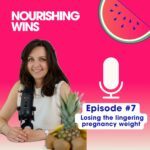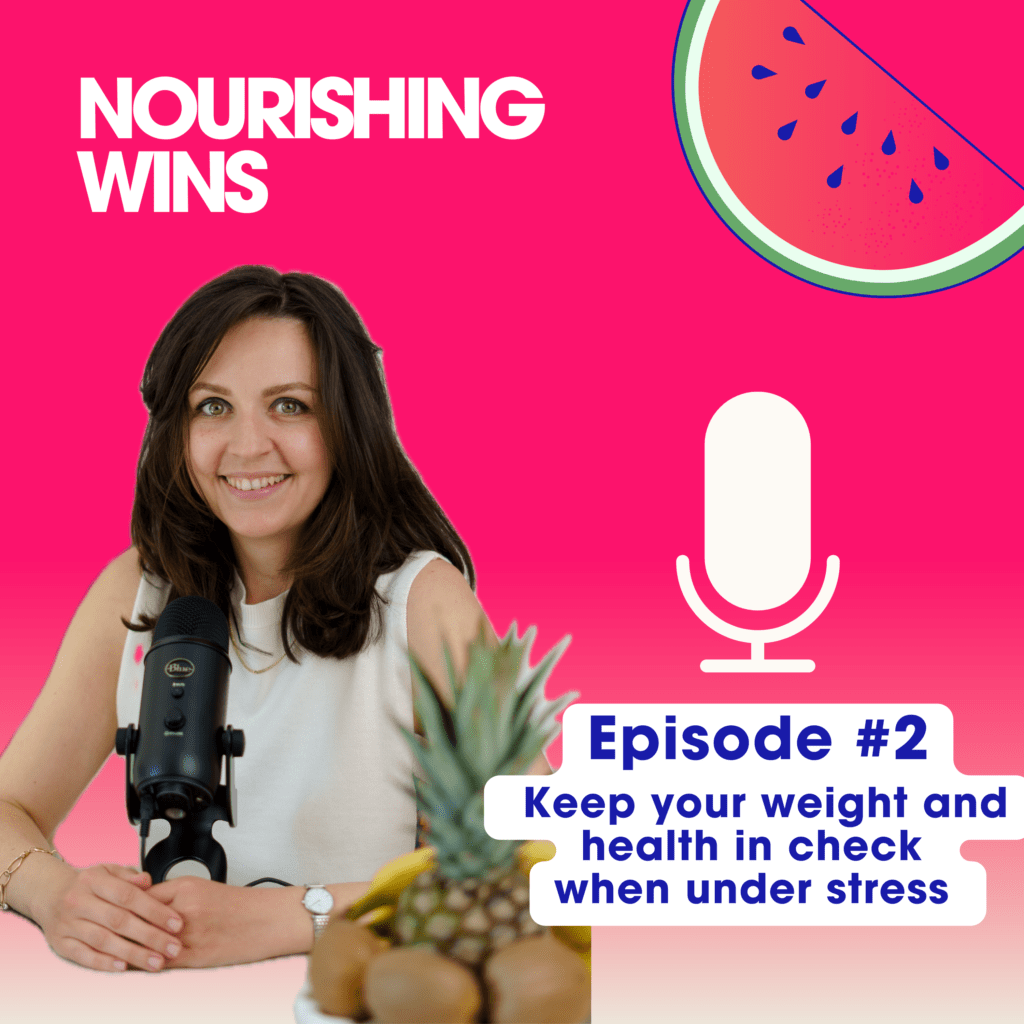
Listen on your Podcasting App
Show Notes
In this episode, I talk about whether lingering pregnancy weight is actually a real reason why some women have excess weight and find it difficult to lose it. It is something that I often hear in my practice and I want to shed some light on what mechanisms actually prevent weight loss after a certain time has passed since giving birth (1 year or more).
Some of the studies and articles mentioned in the podcast:
Maternal Weight Change Between 1 and 2 Years Postpartum: The Importance of 1 Year Weight Retention
Maternal Weight after Childbirth versus Aging-Related Weight Changes


Transcript
Hi friends! How are you?
It’s nice and fresh here in Lyon after a thunderstorm last night and some intense summer rain this morning. I love thunderstorms and it was really beautiful to watch my almost 3-year old daughter discover a real thunderstorm, watching the forest behind our home and running on the coach to hide under the pillows when there was thunder. It is such a privilege to witness your kids discover the world – it’s like you discover it for a second time, but now it’s even better, you are even more mesmerized.
Now the sun has come out but the temperature is still nice because it can get really hot here during summer. I just went for a run and I did 7km today; I’ve never done 7km in my entire life and up until last week I used to do 4km, 4! I am on such high energy lately, a lot of good things are happening, I am seeing results from the decisions I took and the work I did over the past few months and it just feels so good!
Ok back to the topic of this episode, I want to talk about the pregnancy weight retention at 12 months or more after you had your baby. Many of you tell me that the reason you think you have excess weight is because you didn’t manage to lose it after your pregnancies. And that’s 2, 5 or even 8 years later
I had two pregnancies, my youngest is 1 year old and my eldest is almost 3, and if I remember correctly, I was 70 kilograms towards the end of my second pregnancy. I was 54 when I first got pregnant but I didn’t lose all the extra weight between the two pregnancies. I didn’t really feel the need to go back to 54 kilograms.
Now, roughly one year after my son was born, I weigh 57 kilograms and I feel great. I did not restrict calories. But, after 10 years of getting in tune with my body and food, I intuitively make adjustments to have, what I consider to be, proper nutrition. I do not have sweet cravings and I can’t remember when I had them last. That’s not to say that I do not want to have ice cream, a piece of cake or pastries – I love them. I live in France, croissants and pain au chocolat are divine. But I don’t feel a visceral, uncontrollable desire to eat them.
What I am trying to say is that I had a healthy way of eating and probably a well balanced microbiome well before my pregnancies, during and after them.
Why do I think it is worth knowing if it’s indeed the pregnancy weight retention that is to blame or if it’s something else?
Because if it’s not, then living with this illusion covers other factors that could be the real influencers of your inability to lose weight. If you believe that you were less lucky than other ladies that got back in shape quickly after birth, then you are positioning yourself as a victim and this is never useful. A victim does not have the power to influence the result.
And I personally like to get to the real cause of something that I am trying to change. For me or for my clients.
Let’s see what studies tell us concerning pregnancy weight retention.
A study on 30,000 women from 2017 concluded that 1 year post-birth weight gain is roughly the same as for childless women of the same age. There is a constant increase in women’s weight, probably due to loss of muscle mass that slows down the basal metabolic rate and hormonal changes later during menopause.
As a side note, I don’t want you to normalize this trend and think it’s a given, it’s fate. I am a woman and I age, therefore I cannot do anything about weight gain.
Ok, going back to pregnancy weight – so this 2017 study says that if you have + 1-2 kilograms at 1 year post-birth, then you are on the same trend as other women your age. However, after 1-year, the weight of women that are mothers starts to surpass that of childless women. This is due to lifestyle changes of parenthood.
So, it seems that we can’t really talk about pregnancy weight retention 1 year post-partum. There is another study that also emphasizes the 1-year threshold.
I’ll link both studies in the show notes.
The second study, published in 2012, also showed that there is greater variability in late postpartum weight change for women with higher early pregnancy BMI. In other words, being overweight in early pregnancy increase the risk of carrying extra weight in late postpartum.
Another thing that it revealed is that the more difference there is between your weight at 1 year post-birth and your early pregnancy weight (first trimester), the more excess weight you will end up having later.
The 1-year mark is a determinant moment. Does it mean you have to do everything you can to lose weight before hitting 1 year? No, not the unwise things like going on restrictive diets.
They might work in the beginning but they wreak havoc in your metabolism, you will end up gaining even more weight later and it will be harder to lose it. I never advise people to go on crash diets, even if it’s for losing 2 kilograms for your wedding. You will pay it later and it will bring you to a vicious circle of gaining weight, going on a diet and then gaining even more weight that it’s difficult to stop.
But knowing the lifestyle changes you should do before the pregnancy or before the 1 year mark is ideal. If not, starting making improvements no matter where you are in your maternal journey is beneficial and can bring you the results you want.
Let’s see now what stops you from getting rid of excess weight, the weight you thought came from your pregnancy or pregnancies. We established that this excess weight is the result of lifestyle factors, when we go past 1 year post-birth.
As a side note, there is a postpartum condition that can cause your thyroid to be underactive and you should definitely bring this up with your doctor and rule it out. The thyroid controls your metabolism, among other things.
One of the studies I mentioned found that a high early pregnancy BMI (body mass index) predicts if you are going to have excess weight later postpartum. Was this the case for you or was your weight in the healthy range?
Then think about your basal metabolic rate because it accounts for 70% of the total expenditure – it plays a big part in your losing or gaining weight.
This rate represents the minimum amount of energy needed for basic processes that allow you to sustain life, while at rest. Without any physical activity and without digestion.
If you read my newsletter, then you know that this rate can be influenced: through the muscle mass. Since muscles are more metabolically active than fat, meaning they consume more energy, the more you have of them, the faster your metabolic rate is.
The first year after you give birth is probably not the most practical time to build muscles, to say the least. So this is one lifestyle factor which decreases your metabolic rate during this time, and prevents you from losing the pregnancy weight as fast as you would want.
Another lifestyle factor whose presence is exacerbated during postpartum is lack of sleep. And you know that when you don’t get enough sleep or you go to bed too late, you gain weight.
Lack of sleep is a stressor for your body and continuous stress leads to chronic levels of cortisol – the most well known stress hormone. Cortisol results in more fat being stored and distributed around the waist.
There is no question most women go through prolonged stress during the first year after their baby is born. Each of us experiences it differently, has different circumstances and different help from family and society. But I have not met a new mum that has enough sleep, is not stressed, eats nutritious, home-made food – and I might stop here AND is not able to lose weight 
Physical activity is also important in determining whether you lose weight or not. It contributes to your energy expenditure. You are already carrying your baby and doing a million things to care for him or her. But if you adopt a sedentary lifestyle because you don’t have the time to go out and walk or exercise, then you might be in caloric surplus.
And finally, the factor that completes the explanation of why you might experience excess weight 1 year or more after you have birth: nutrition. What you eat makes the difference. Do you have a diet high in nutrient-dense, whole foods and low in ultra processed, white flour foods and sugar?
And, if you know me, I am not for calorie counting. Not all calories are equal, they have different effects on your metabolism, cell health and microbiome. 200 calories from broccoli is definitely not the same as 200 calories from a Coke.
But it is possible you are in caloric surplus if you were told you can eat more because you breastfeed for example and you don’t pay attention at all to quantities or your meals are too heavy in starches: potatoes, bread, rice, pasta).
As you progress into your maternity, being a mum of one or more toddlers or young children continues to add new challenges, which make it more and more difficult to prioritize your needs for nutritious food, physical activity, relaxation and sleep. And so your weight starts to be higher than it would have been if you had no children. But it’s not because of the pregnancy weight, but because of lifestyle changes associated with motherhood.


